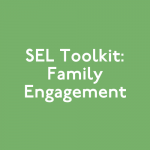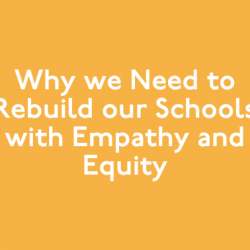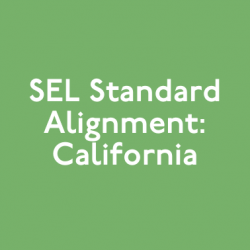Take a look at any district strategic plan or school mission, you’ll find that improving school culture and climate will be at the top of the list – and for good reason! A school environment affects a student’s ability to learn, a teacher’s capacity to authentically connect with their students and create engaging, effective lessons, and a parent’s level of confidence and trust in their child’s school. You can start with the strongest, evidence-based SEL curriculum, purchase the newest education technology and hire the most experienced and skilled teachers, but without a positive school culture, you likely won’t see success.
A positive school climate is integral to the success of any educational environment. We understand its importance, but what exactly do we mean when we say positive school culture?
At Move This World, we define as a positive school culture as….
A community in which every school member (students, teachers, leaders, and parents) can grow, adapt, connect and navigate life’s challenges together because they feel seen, supported and valued.
Creating a positive school culture and climate where every member feels this way is challenging work. It will always be an ongoing process, and there are many ways to foster a positive school climate. Implementing a universal social emotional learning program ensures that a strong foundation is in place by giving students and teachers the skills to develop strong relationships, create safe schools, and build supportive learning environments.
Social emotional learning helps students and adults develop key skills within the five core social emotional learning competencies as defined by the Collaborative of Academic, Social and Emotional Learning (CASEL): self awareness, self management, social awareness, relationship skills and responsible decision making. As students and teachers work together to strengthen these social and emotional learning skills, school culture will improve.
Through conversations with school districts across the country, we hear about the attributes that contribute to either a negative school culture or a positive school culture. We’ve taken the 7 concerns we hear most often and broken down how a universal social emotional learning program will help schools work past these challenges and improve their school culture:
1. Challenge: Lack of communication and honest conversations.
Solution: SEL establishes a common language and develops communication skills.
A strong social emotional learning program should help school communities develop a common language to lean on when discussing emotions, challenges, and conflict. For example, Move This World uses “Emogers” to help students and staff develop and discuss emotional management strategies and self-regulation techniques. A common language helps us navigate difficult conversations and hold one another accountable in a less threatening way. When we can talk about our emotions and resolve conflict successfully, we improve our ability to work together.
2. Challenge: Lack of understanding.
Solution: SEL builds and strengthens empathy.
Social emotional learning gives us an opportunity to better understand one another. SEL offers opportunities for authentic connection between students, staff and school leaders. As school communities begin to share personal experiences with one another, we begin to better understand what our colleagues and peers are carrying with them each day. Communities begin to recognize that we all have challenges we’re working through as well as moments of pride to celebrate. Seeing similarities and differences between one another develops empathy, cultivates a stronger community, and contributes to supportive school culture.
3. Challenge: Lack of collaboration.
Solution: SEL helps individuals work together in diverse groups.
Social emotional learning builds and strengthens key communication, collaboration and leadership skills that help students and adults successfully work together in group environments. More importantly, SEL helps our communities recognize differences, respect diversity, and develop empathy for one another. This means that individuals will be able to successfully navigate working relationships with people that might have differing opinions, viewpoints or beliefs. When all team members are able to work together, regardless of their differences, the school community will be able to work together more cohesively.
4. Challenge: Lack of purpose.
Solution: SEL creates time and space for authentic connection.
Social emotional learning helps students and teachers develop self-awareness, recognize strengths, and create goals for the future. An SEL program should give time for self-reflection for students and adults to identify their passions and create goals to help them fulfill their purpose. By giving students and adults time to authentically connect with themselves, we help them establish a stronger sense of purpose. By giving them time to authentically connect with one another, we give them the opportunity to support each other and create a shared vision for forward progress.
5. Challenge: Lack of support.
Solution: SEL provides a universal support for all and helps teachers identify students who need additional support more proactively.
A universal social emotional learning program ensures that all students receive foundational SEL support. Oftentimes, SEL and mental health supports have lived within the tier 2 and 3 branches of the MTSS model, and students identified based on academic or behavior concerns received interventions. Research has proven that all students need and benefit from SEL. By providing time and space for students and teachers to check in with themselves and with one another, teachers can more proactively identify students who might be in need of tier 2 or 3 support. Additionally, students and adults will get more comfortable recognizing their emotions and stressors, identifying when they need help, and asking for this support as needed. By providing universal support, we ensure all students are seen, heard, and supported.
6. Challenge: Lack of risk taking.
Solution: SEL encourages risk taking and help individuals work past fears of failure.
Mistakes create opportunities for learning. In order for our students to grow and develop, we must encourage them to take risks. In order for our schools to improve, we must empower our adults to take risks as well. Social emotional learning helps individuals work past their fear of failure by developing a growth mindset, emotional management strategies, and goal-setting skills. When school community members have the skills to feel comfortable and confident to take risks, a school culture that supports growth and development will continue to blossom.
7. Challenge: Lack of supportive relationships.
Solution: SEL builds stronger and deeper relationships.
At its core, social emotional learning is all about relationships – the relationships we have with ourselves, and the relationships we have with those around us. All five SEL core competencies directly contribute to the development of healthy intra-personal and interpersonal relationships. Self-awareness and self-management directly impact our relationship with ourselves. Social awareness and relationships skills naturally impact our ability to cultivate and sustain authentic relationships with others. As students and adults develop these skills they will be better able to maintain authentic relationships. As they form more meaningful relationships with one another, the culture in the school will only continue to improve. By opening up the time and the space to authentically connect with one another, understand one another challenges, and support each other – we deepen the relationships across our school communities.
Interested in learning how Move This World can help you with your school culture initiatives? Schedule a time to speak with a Move This World education consultant.
Sign up for Move This World’s newsletter to stay up to date on ways to improve school culture










